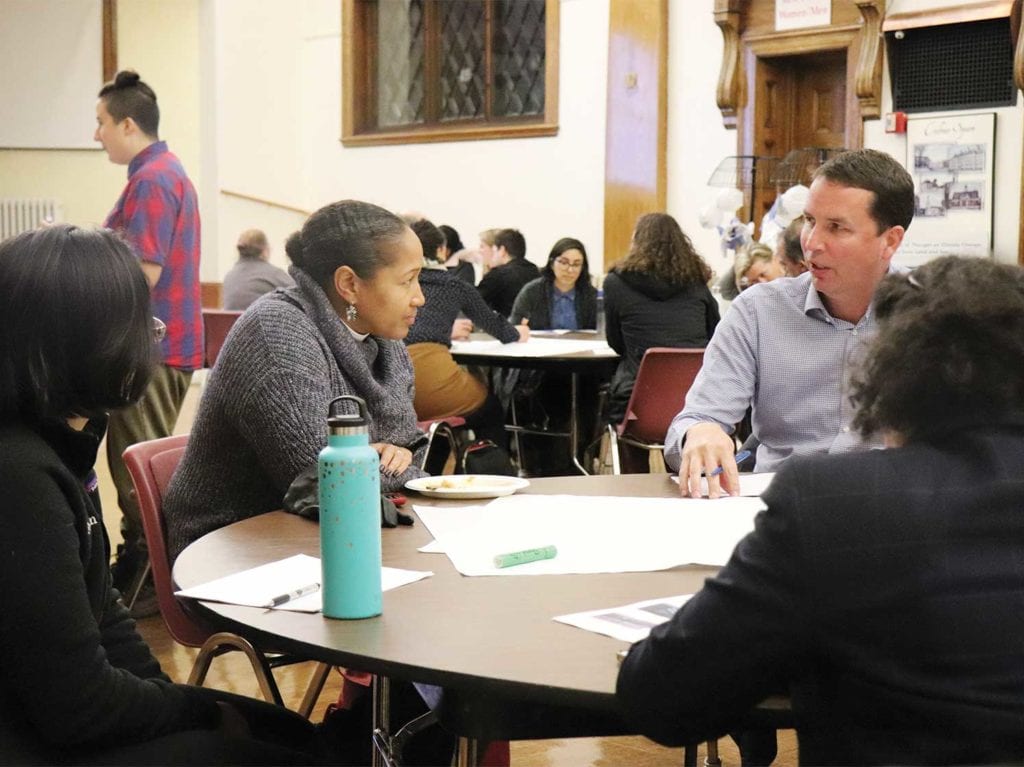Working toward equity in climate change solutions
Environment Dept. launches Greenovate Boston

As the City of Boston moves ahead toward its environmental goal of carbon-neutrality, a city department has launched a program to make sure climate change preparation and activism is being made accessible to Boston’s residents of color.
Working under the City of Boston’s Environment Department, Greenovate Boston held a roundtable discussion event last Wednesday evening to talk about racial equity and climate change. About 20 people gathered in the Great Room at the Codman Square Health Center in Dorchester for a presentation from Greenovate community leaders on how climate change affects people of color.

Greenovate outreach manager David Corbie says low-income people of color are the least likely to be prepared for the impacts of climate change. PHOTO: EILEEN O’GRADY
“A lot of times when we think of climate change, we think of it as something that is far removed from us,” said Greenovate Boston leader Rochelle Higgins. “Especially in low-income communities, climate change is something that is very far from their minds and thoughts. They’re thinking how to make ends meet, how to provide for their families. But climate change is happening now and it’s impacting all of us.”
Sharon Amuguni, one of the discussion facilitators, explained that the effects of climate change have a harder impact on populations who are already vulnerable. For example, when it comes to extreme heat waves and air pollution, she said, it’s the neighborhoods with very little green space that fare the worst — in Boston, those neighborhoods are predominantly black, Hispanic or Asian.
The same goes for extreme precipitation and flooding.
“The areas that will see a heavily increased amount of flooding seem to be areas such as Roslindale, Mattapan, Dorchester and Jamaica Plain, just to name a few,” Amuguni said, pointing to a flood map of Boston. “Imagine our work commutes, our transit commutes, with that much rain.”
David Corbie, Greenovate Boston’s outreach manager, said that in the event of a climate emergency or natural disaster, it’s low-income people of color who are less likely to be prepared.
“How can somebody who is in poverty or makes a certain income, how can they really prepare for climate change?” Corbie said. “If I’m somebody that is making $15 an hour or $10 an hour, what is my likelihood of being able to … prepare my family for a coastal storm? If there is extreme heat or if there is extreme cold, or if there is a huge snowstorm, what does that do to somebody, how can they rebound from that?”
The Greenovate team said that green solutions like clean energy and energy-efficient homes should be made accessible to low-income communities of color as well.
“To address racial equity, this means addressing basic questions like renewable energy expense and the cost,” Amuguni said. “How do we make sure that everyone can afford it? What if updates to my house increase the likelihood of gentrification in my neighborhood?”
After the presentation, attendees broke into small groups to discuss what communities can do to prepare and what solutions Corbie says he loves the small-group discussion format because it allows all attendees to get a chance to meet and hear each other’s ideas.
“It’s not so incumbent upon city staff being there to have the discussion,” Corbie said. “It’s more on community members taking interest and being passionate and then wanting to bring it to their communities because they see the value, and the impact that climate change is going to have.”
Dorchester resident Judy Rose, who attended the event, said she felt it was her obligation to learn more about how she can help to lessen the effects of climate change in her own community, which she described as vulnerable.
“I’m glad it’s happening … and that the conversation is brought to the inner city of Boston for people of color to learn and be a part of the change that we want to see,” Rose said. “If we’re not informed, we are vulnerable, and we need to be less vulnerable and take action for ourselves as well.”
Eileen O’Grady writes for The Scope, a project of Northeastern University’s School of Journalism.






